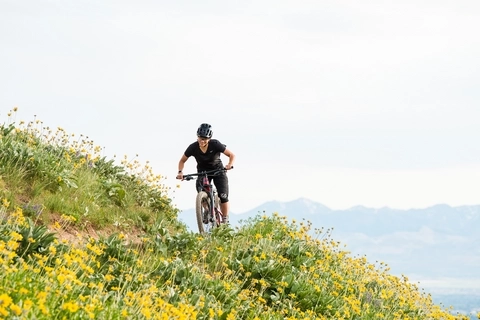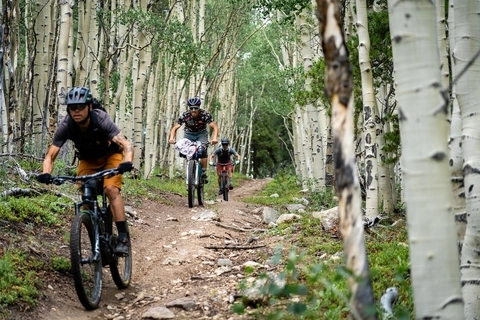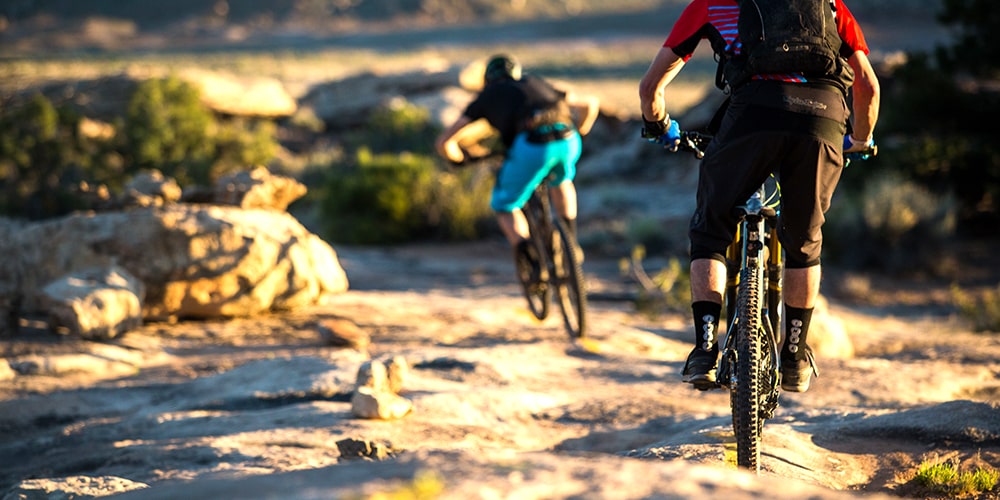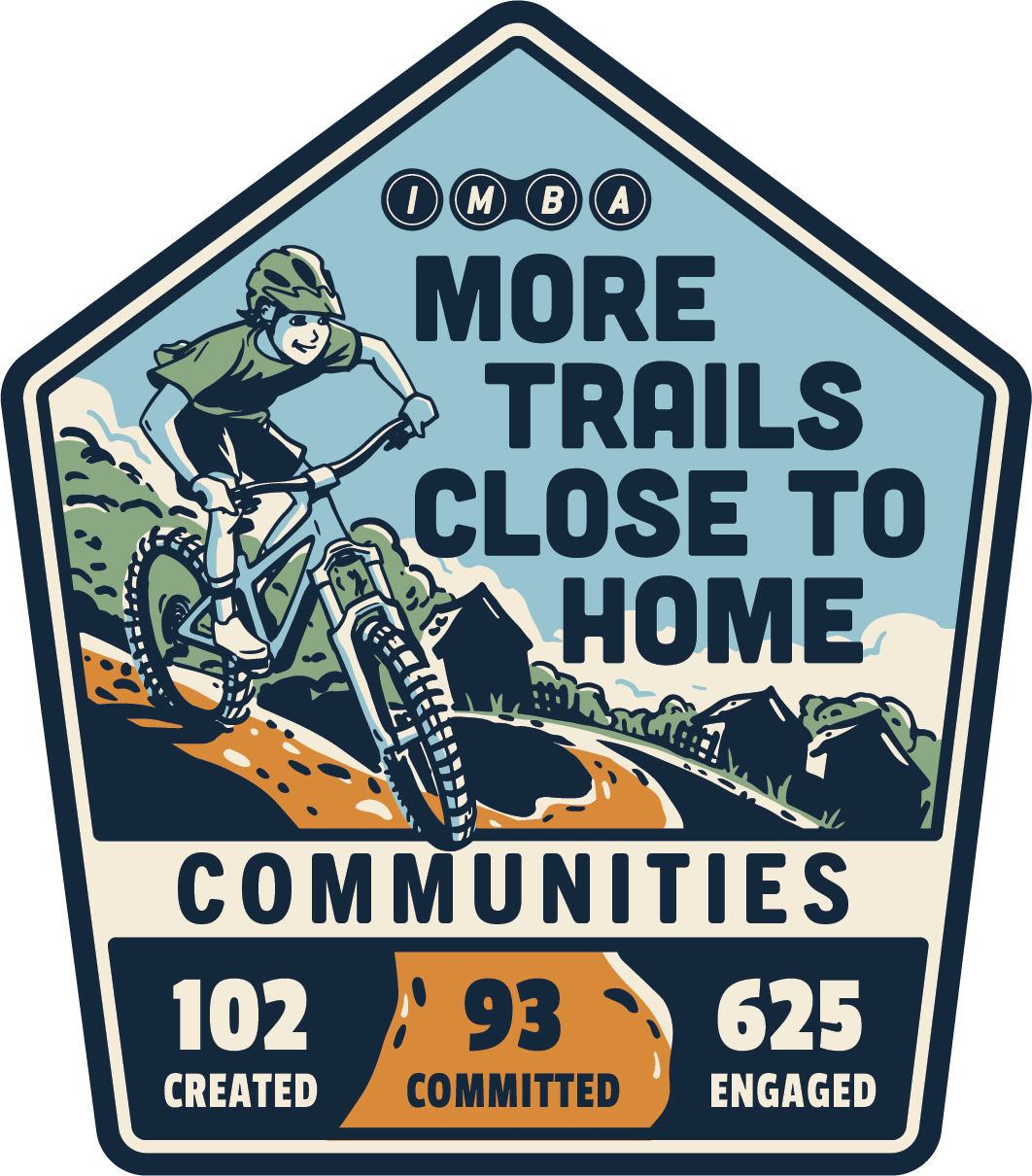Lifeline, Shoreline Film Advocates to Complete Utah’s Bonneville Shoreline Trail
Media contact: Eleanor Blick
IMBA Director of Communications
(720) 900-4622
(BOULDER, Colo., Dec. 20, 2022) — The International Mountain Bicycling Association (IMBA) is pleased to award its sixth round of Trail Accelerator grants to ten communities, granting $122,500 to help bring more trails close to home in Arkansas, Illinois, Kansas, Kentucky, Maine, South Dakota, West Virginia and Wisconsin.
IMBA’s Trail Accelerator grant fund is a competitive grant offering for communities with visions of transformational model trail systems that need extra support to realize that vision. Projects must show strong partnerships between local leaders, government entities, land managers, property owners, community groups and mountain bike or trail organizations such as IMBA Local partners. Grant recipients partner with IMBA Trail Solutions for professional trail planning and consultation—having a professional trail plan can help a community generate more interest and investment for trail projects.
“We’re in an exciting phase of the Trail Accelerator grant program, now watching more trails and counting as trails are created in communities that received awards two and three years ago. It’s amazing the momentum a community can generate for trails with a professional trail plan in-hand,” said David Wiens, IMBA Executive Director. “We look forward to working with these ten new communities for months and years to come, partnering on trail plans and beyond to help transform communities through trails.”
Between 2018 and 2021, 33 active Trail Accelerator grant projects have received $454,500 in grant awards, leveraging that initial support to raise more than $12.7 million in funding to create new trails. Trail projects like those in Tahlequah, Oklahoma; in Cacapon, West Virginia, and in Erwin, Tennessee, have quickly moved from vision to completion by receiving a Trail Accelerator grant and using the resulting professional trail plan to exponentially grow community support.
2022 Trail Accelerator Grant Recipients:
Pine Bluff, Arkansas — Community-Wide Feasibility Study
Danville, Illinois — Harrison Park Trails
Lawrence, Kansas — Community Park at Cameron’s Bluff
Olive Hill, Kentucky — Fire Brick Lake Family Rec Park
Patten, Maine — Elliotsville Foundation, Inc. Trail Center
Sioux Falls, South Dakota — Great Bear Park
Elkins, West Virginia — Elkins Area Shared Trail Plan
Mathias, West Virginia — Lost River State Park MTB Trails
Washburn, Wisconsin — Washburn Bike Park
Eau Claire, Wisconsin — Wells Trails
All ten projects will bring more trails close to home for the local community. This increased local access will offer health benefits to residents, bring trail recreation to places with none, and offer opportunities for youth to get outdoors. See below for more detailed descriptions of each community’s trail project.
To date, 118 communities have applied for an IMBA Trail Accelerator grant and 43 communities have received awards. IMBA has awarded a total of $577,000 to Trail Accelerator grant recipients between 2018 and 2022, and appreciates all the generous donors who have contributed in support of more trails close to home. IMBA thanks the Walton Family Foundation for underwriting the 2022 program as well as support from Shimano and PeopleforBikes.
The next application period for Trail Accelerator grants will be in summer 2023. Interested applicants can learn more about grant criteria and eligibility on the grant webpage. Read about the progress of current Trail Accelerator grant recipients on the IMBA blog.
2022 IMBA Trail Accelerator Grant Projects:
Community-Wide Feasibility Study in Pine Bluff, Arkansas — This project will examine Jefferson County for the best opportunities for trails, both shared-use and bike-optimized, since this area has no mountain biking trails currently. Led by Go Forward Pine Bluff, a community development organization, this effort will establish priority lands where trails will most benefit the community. Goals include increasing community health, engaging youth in the outdoors, and creating economic tourism draw for nearby communities, which also lack trails.
Harrison Park Trails in Danville, Illinois — This plan will bring the first trails to city property, while revitalizing an historic park that contains structures from the Roosevelt area that many residents have never seen. The recently formed Vermillion County Trail Alliance has created a bike park vision that includes a skills area and singletrack on this property, which will bring outdoor opportunities to all, but especially to nearby neighborhoods across diverse socioeconomic, racial, and cultural backgrounds. Outdoor recreation development is an exciting shift for this Rust Belt community that has historically focused on industry.
Community Park at Cameron’s Bluff in Lawrence, Kansas — This effort, led by the Lawrence Mountain Bike Club and its partners, including Friends of the Kaw and Friends of Lawrence Area Trails, will study land along the Kansas River for optimal trail development with some concept planning and beginning stages of design in mind. Trails at Cameron’s Bluff would provide first-time access to open space along the Kansas River on land owned by Evergy, Inc., which supports the effort. The study will consider best access points, ideal approach for trails, and future development potential that will benefit adjacent underserved neighborhoods and other entities including Lawrence Memorial Hospital, the Bert Nash Mental Health Center, a nearby elementary school, and downtown Lawrence. Equally important, the trails would connect directly to the Lawrence Loop, which would provide safe, car-free access from all quadrants of Lawrence, from Haskell Indian Nations University in the south to Rock Chalk Park in the northwest, and all areas in between. This proximity would benefit the local NICA mountain bike team, as well as enable a partnership with the Boys and Girls Club. Providing access to nearby outdoor recreation opportunities would also boost community health and create potential for economic impact through regional tourism.
Fire Brick Lake Family Rec Park in Olive Hill, Kentucky — This project will bring natural surface trails to the town of Olive Hill, which will then serve as a model community along the Warrior’s Path, a 12,000-year-old track that Native Americans used for commerce and communication. That greater project seeks to preserve the trail and honor native Applachians, while bringing recreation and economic boost to the small mountain towns along the way. A key component is the Pathfinder Initiative, a program that ties economic development through outdoor recreation and tourism to substance abuse prevention and overall health and wellness. Olive Hill has formed the first Pathfinder Coalition of local organizations to focus on teen substance abuse through healthy outdoor recreation. To help deliver on these goals, the TAG grant plan will create approximately four miles of trails ready for shared-use enjoyment as well as access for adaptive riders — while providing a positive outlet for a community dealing with obesity, health challenges and poverty. Once the trails are in place, the lessons learned will be passed on to twenty other counties along the Warrior’s Path to assist their own development.
Elliotsville Foundation, Inc. Trail Center in Patten, Maine — There are few singletrack trails close to Patten at this time, so this design effort, led by the Elliotsville Foundation Inc. at their Northern Base Property, will add five miles of trail and a skills area to a parcel much closer to home for residents. These amenities will provide rider progression while offering options for winter grooming for fat bikes. The trails will be accessible from a gear library also funded by Elliotsville Foundation, Inc. that is already under construction, which will loan bikes and outdoor gear to visitors and locals alike, lowering the financial barrier to entry for new riders. In that same facility, they plan to hold maintenance clinics and other educational sessions in partnership with area youth and outdoor programs, including trail building courses on site by way of partnership with the Outdoor Sports Institute and Katahdin Area trails.
Great Bear Park in Sioux Falls, South Dakota — Residents have long valued this park for its winter activities, but want to see expansion for more summer options. Led by local mountain bike group Falls Area Single Track, this plan’s goal is to add up to eight miles of bike-optimized trail for all levels beyond the existing hiking trail experiences. The proximity to town will offer quick connection for residents, and ensure access for adaptive riders, giving those athletes year-round recreational opportunities. As the area works toward creating a high school racing league, the site could host youth events and kids’ camps, while also bringing economic benefit to the town and preserving natural lands surrounded by industry.
Elkins Area Shared Trail Plan in Elkins, West Virginia — This project, a partnership between Elkins Area Shared Trails, West Virginia University’s Brad and Alys Smith Outdoor Economic Development Collaborative, and the Monongahela National Forest, will examine U.S. Forest Service properties in the western part of the Cheat-Potomac District. The team will start with large landscape trail planning with the goal of locating a site for 8-10 miles of flagged trail. West Virginia is known for its challenging, natural trails (already a great asset), but this effort will introduce purpose-built, multi-use, and bike-optimized trails to the area, while providing more progressive entry to the sport for new riders, particularly the local NICA team and West Virginia’s only collegiate MTB team. Additionally, new trails will improve public health, resident recruitment and retention and tourism spending for Elkins and other nearby communities.
Lost River State Park MTB Trails in Mathias, West Virginia — Hardy County has great outdoor opportunities, but no well-designed mountain bike trails; especially those suited to experienced riders, novice mountain bikers, or challenged athletes. The Lost River Trails Coalition and their partners, Hardy County Convention & Visitors Bureau and Lost River State Park, hope to change that with a brand new trail system for all skill levels to enjoy. In particular, they hope to serve the community as a whole by optimizing the entire system–including parking lots, bathrooms and access points–to accommodate riders using standard bikes as well as adaptive equipment and e-bikes. This trail plan will help them conceptualize the system as well as locate their first beginner trail for quick implementation. These amenities will bring key tourism dollars to the area while also helping to combat residents' health challenges. Finally, having high quality trails will facilitate new youth programs and potentially provide space for NICA training and/or events.
Washburn Bike Park in Washburn, Wisconsin — The City of Washburn is looking at several potential locations for a bike park, and this planning project will help the city select the best option. The resulting concept plan will outline riding and learning opportunities for riders of all experience levels while providing closer recreation opportunities to town. The proximity to schools will make the park an ideal spot for both new and existing youth programming, which includes a learn-to-ride program, a local NICA team and a Little Bellas chapter. The bike park will provide a valuable point of entry for new riders while helping progress the skills of riders at various levels of experience.
Wells Trails in Eau Claire, Wisconsin — This plan looks to add six to ten miles of new, bike-optimized trail and skills features to a 350-acre city park that already serves hikers as well as cross-country runners and skiers. The Chippewa Off Road Bicycle Association (CORBA) will partner with those users, along with local NICA teams, youth adventure groups, local high schools and University of Wisconsin Eau Claire. These partners will work to develop experiences for mountain biking, fat biking and adaptive riders, as well as create better athletic training opportunities and event space potential for all trail users. CORBA will have more opportunities for hosting their established youth and women’s clinics, while the park’s proximity to adjacent neighborhoods will encourage new users.
##
About IMBA:
The International Mountain Bicycling Association (IMBA) creates, enhances and protects great places to ride mountain bikes. It is focused on creating more trails close to home to grow the quantity and quality of mountain bike trail communities across the U.S., so everyone has access to close-to-home rides and iconic backcountry experiences. Since 1988, IMBA has been the worldwide leader in mountain bike advocacy and the only organization focused entirely on trails and access for all types of mountain bikers in all parts of the U.S. IMBA teaches and encourages low-impact riding, grassroots advocacy, sustainable trail design, innovative land management practices and cooperation among trail user groups. IMBA U.S. is a national network of local groups, individual riders and passionate volunteers working together for the benefit of the entire community.







